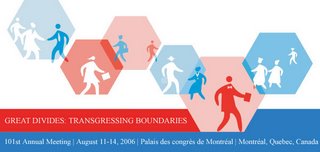Transgressing or reaffirming?
After a week of hobnobbing and listening to fellow sociologists at the annual meetings of the American Sociological Association I'm confronted once again with the diversity of perspectives found among the roughly 14,000 it claims as members. We take pride in that diversity, in fact we want more! As is evident in the conference theme, "Great Divides: Transgressing Boundaries," what pleases us most is the unity and inclusiveness we find in that diversity.
 As geeky academics moved from presentation to presentation, event to event, each saw a tiny fraction of the thousands of conference attendees. We met with others specializing in our brand of sociology who, depending on how finely you want to draw those distinctions, may number fewer than ten or as many as several hundred. Like people outside the discipline we are drawn to likeminded others and prone to dismiss or even overlook those who differ. Black sociologists talk with other black sociologists; gay sociologists with other gays; women with women; men with men; marxists with marxists; liberals with liberals. With so many boundaries implicitly drawn between us, how unified and inclusive can we really claim to be?
As geeky academics moved from presentation to presentation, event to event, each saw a tiny fraction of the thousands of conference attendees. We met with others specializing in our brand of sociology who, depending on how finely you want to draw those distinctions, may number fewer than ten or as many as several hundred. Like people outside the discipline we are drawn to likeminded others and prone to dismiss or even overlook those who differ. Black sociologists talk with other black sociologists; gay sociologists with other gays; women with women; men with men; marxists with marxists; liberals with liberals. With so many boundaries implicitly drawn between us, how unified and inclusive can we really claim to be?
Sometimes the boundaries between sociologists are brought into stark relief, as is visible in this post (and subsequent comments) that uses mockery and derision to suggest what counts as good sociology. Here you'll find sociologists resistant to the incursion of animals in sociological analyses as well as a more general angst about the blurring of science and politics (the latter also clearly expressed in the ongoing brouhaha over "public sociology").
Sometimes those boundaries escape our attention. One of the most provocative speakers I heard at the conference was Indiana's Tom Gieryn whose twenty-plus year search for the social boundaries of Science has recently led him away from the question of why boundaries change to asking why they don't. He contrasted two buildings: one, a drab, box-like federal building in which a judge heard arguments for and against the inclusion of Intelligent Design in the science curriculum, and the other, Stanford University's Bio-X research facility whose avant-garde design embodies an ethic of collaboration and openness with its open laboratory space and walls on wheels. Gieryn's elegant contrast between the fixed architecture of the courtroom and the fluid design of Bio-X showed, ironically, that the social boundaries of Science are most structured (in the sociological sense) precisely where they are most taken-for-granted.
Meetings such as this highlight the shared vision and experiences of professional sociologists and reestablish our solidarity in a common enterprise. But they also reaffirm the divisions among us. Are we content to praise this as an effective "division of labor?" Or, should we be concerned that we are reproducing the familiar inequalities we study?
Labels: sociology
August 16, 2006 7:26 PM
I did Gieryn and wish I had been able to see the talk -- sounds really good.
August 16, 2006 7:30 PM
Hm. That's "dig." I _dig_ Gieryn.
August 16, 2006 8:00 PM
nice post. this year i hung with some community college folks who had a way different take on the meetings and asa status hierarchies. monte bute sez "there is no profession so hypocritically insensitive to the social inequality within its own ranks, or so intellectually inept at recognizing how its own taken-for-granted practices create and perpetuate this academic caste system." ouch.
August 17, 2006 12:33 PM
Daintily dabbing tears from eyes: Can't we all just get along? Sure, my research since arriving in grad school seven years ago has centered on an autoethnography involving me and my companion hamsters Jeremy and Mathieu, but can't you see I'm transgressing boundaries?
I got a whif of a few of those "mockers" and "deriders" in Montreal and, yo, they gots the distinct smell of MEAT EATER about them.
And, oh, don't get me started on the "academic caste system." It is sooo un-emo...
Don't be a hater...
August 18, 2006 5:20 AM
"And, oh, don't get me started on the "academic caste system." It is sooo un-emo..."
But isn't gazing blankly into space, tears dripping onto clunky 1989-vintage black shoes, while contemplating the UNFAIRNESS of it all kinda emo?
August 18, 2006 11:07 AM
Five points for you #2 anonymous. Yea, I guess it IS kind of emo.
- meat is murder